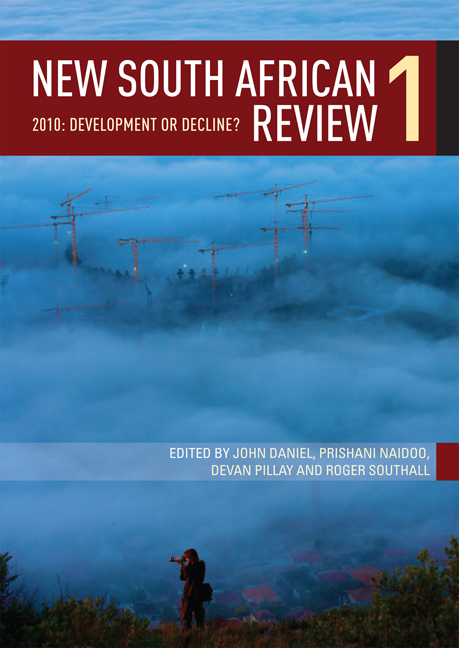Book contents
- Frontmatter
- Contents
- Preface
- Introduction South Africa 2010: From short-term success to long-term decline?
- PART 1 ECONOMY, ECOLOGY AND SUSTAINABILITY
- Introduction South Africa and the eco-logic of the global capitalist crisis
- CHAPTER 1 The state of the South African economy
- CHAPTER 2 The international economic crisis and employment in South Africa
- CHAPTER 3 The economic impact of South Africa's 2010 World Cup: Ex ante ambitions and possible ex post realities
- CHAPTER 4 Growth, resource use and decoupling: Towards a ‘green new deal’ for South Africa?
- CHAPTER 5 Planning for sustainable living with limited water
- PART 2 STATE, POLITICS AND POLICY
- PART 3 EDUCATION, HEALTH AND LAND
- PART 4 Doreen Atkinson
- Contributors
- Index
CHAPTER 4 - Growth, resource use and decoupling: Towards a ‘green new deal’ for South Africa?
from PART 1 - ECONOMY, ECOLOGY AND SUSTAINABILITY
Published online by Cambridge University Press: 21 April 2018
- Frontmatter
- Contents
- Preface
- Introduction South Africa 2010: From short-term success to long-term decline?
- PART 1 ECONOMY, ECOLOGY AND SUSTAINABILITY
- Introduction South Africa and the eco-logic of the global capitalist crisis
- CHAPTER 1 The state of the South African economy
- CHAPTER 2 The international economic crisis and employment in South Africa
- CHAPTER 3 The economic impact of South Africa's 2010 World Cup: Ex ante ambitions and possible ex post realities
- CHAPTER 4 Growth, resource use and decoupling: Towards a ‘green new deal’ for South Africa?
- CHAPTER 5 Planning for sustainable living with limited water
- PART 2 STATE, POLITICS AND POLICY
- PART 3 EDUCATION, HEALTH AND LAND
- PART 4 Doreen Atkinson
- Contributors
- Index
Summary
The 1994 democratic transition heralded unprecedented change. Virtually every facet of policy and practice in the emergent democratic state was reviewed and revised. A bill of rights forms part of the new constitution and specifically guarantees the right of all South Africans to have the environment protected for the benefit of present and future generations. More pertinently, section 24 (b) of the constitution obliges stakeholders, in civil society and government, to ‘secure ecologically sustainable development’. But reconciling complex and sometimes conflicting relationships between poverty, economic development and protection of environmental assets is a major challenge. In particular, the dominant economic growth and development paradigm fails to address a wide range of underlying resource constraints that can rapidly undermine the preconditions for the kind of developmental growth that is required to reduce inequalities and poverty over time. Remarkably, although the South African government has systematically increased financial support for scientific research because it is believed that scientific knowledge reinforces development, this self-same community of scientists is generating research that raises very serious doubts about whether South Africa's resource-intensive economic growth path can continue in light of the rapid depletion and degradation of the country's natural resources (see Burns and Weaver 2008).
This gathering scientific consensus (made possible by significant increases in state funding for scientific research almost exclusively in the natural sciences) has had limited impact on economic policy making and virtually no impact on the underlying theories of economic growth that inform the thinking of the economic policy-making community. Government either needs to listen to the scientists and change the economic model, or explain why it chooses to ignore the science.
GLOBAL CONTEXT
There is a broad global consensus that we face the unprecedented twin challenge created by interlinked economic and environmental crises. As the economic and environmental crises mutually reinforce one another, decision-makers across the public, private and nonprofit sectors in both the developed and developing world intensify demands for practical solutions. A succession of global mainstream assessments over the past decade have together raised very serious questions about the sustainability of a global economic growth model that depends on material flows that have reached – or soon will reach – their natural limits (Barbier 2009; Gleick 2006; Intergovernmental Panel on Climate Change 2007; United Nations Environment Programme 2007; United Nations 2005; Watson et al 2008; World Resources Institute 2002; World Wildlife Fund 2008).
- Type
- Chapter
- Information
- New South African Review2010: Development or Decline?, pp. 104 - 134Publisher: Wits University PressPrint publication year: 2010

